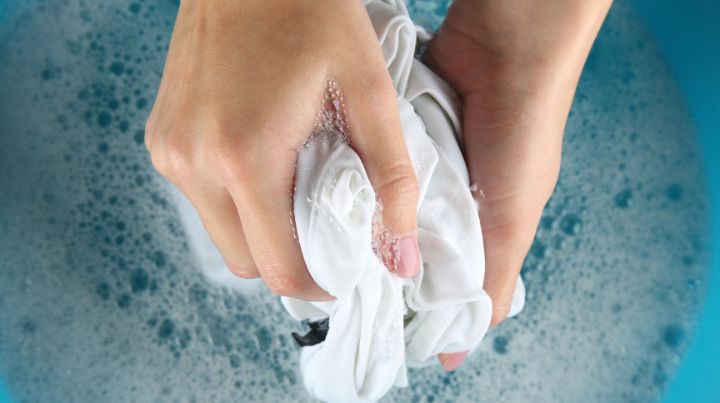SHTF Sanitation: Staying Sterile While in Peril

When life expectancy increased dramatically during the late nineteenth and early twentieth century, there were still no antibiotics. The increase in life expectancy was driven by the improvement in sanitation. People began to understand the importance of cleanliness.
We take cleaning for granted now because we have so many gadgets that do most of the work for us. Most of us just load dishes in the dishwasher, shove dirty clothes in the washing machine, push a button, and forget about it.
However, it’s good to give these tasks a little more thought. In case of an extended emergency, keeping clean will not only be more difficult, but also more important.
Dish Washing
A few years ago, I had the opportunity to attend a lecture by a very elderly microbiologist who also led Boy Scout Troops on campouts back in the 1940s.
He had some interesting points about camp sanitation. He said that, despite very primitive sanitation techniques, he never had a camper get sick in his years of camping. He attributed this to the lack of plastic. Everything was stainless steel in the 1940s, which meant you wash could wash the food off your dishes and then boil all of the cookware for 10 minutes, and it would be sanitized.
Because of its porosity, and the fact that you can’t boil it, plastic is much harder to keep absolutely clean. Yes, plastic is lighter and cheaper; but the microbiologist strongly encouraged anyone that could afford stainless steel gear, to buy it. It was that much easier to keep clean, especially on week-long campouts.
Now, if you leave chunks of food on the dishes thinking, “Meh, I’m going to boil it anyway, it’ll all sterilize,” think again. As soon as you pull it out of the boiling water, germs will find any food chunks encrusted on your dishes and make them home. You need to actually get all the food off the dishes first and then boil them.
This sounds easy, but it’s surprising how many little pieces of food can still be left on dishes after their trips through the dishwasher. Or, if you are trying to get children to wash dishes by hand, how many pieces they’ll leave on. Or, I’ll admit it, I’m getting older and my vision is terrible. Sometimes I need to wash a dish two or three times, too.
I’m not saying you should get rid of your dishwasher, but you may want to get in the habit of inspecting your dishes carefully afterward. I had dishwashers in a few different houses I’ve lived in. Some worked better than others. And while slightly-dirty dishes aren’t a huge deal while you’re enjoying a high overall standard of cleanliness, when the dishes are in a backpack or a tent instead of in a relatively clean cupboard, they’re one of the places attractive to various microorganisms that can make you sick.
I haven’t had a dishwasher in about ten years. This wasn’t intentional. I bought an old homesteading cabin with non-standard plumbing, thinking I could afford to fix it, but then I couldn’t. So I never got around to getting a dishwasher, but my children camp regularly, and I have received countless compliments over the years regarding their dishwashing ability. It’s a skill worth practicing once in a while.
Laundry
Several years ago, my boys were camping with groups of boys from around the country. One troop brought a nasty stomach bug with them, and most of the troops wound up with sick kids. My boys’ troop, however, did not.
Maybe some of this was luck. It may also have been that, as soon as the leaders heard that there was a stomach bug going around, they started washing everything religiously. Normally on campouts, the boys are good about dishwashing, but no one nags them about changing their clothes every day—this time, they did. One of the leaders had brought a plunger with him. Since they always had buckets, they washed everyone’s clothes every day.
Places like Lehman’s sell inexpensive rapid washers like this one, and supposedly they work really well. But a plunger with a few holes drilled into it did the trick at my boys’ campout, too.
Soap
We’ve got countless brands and styles of soap on the market for a reason. I’ve got plenty of different kinds around my house. But, if I had to pick only one kind to bring to wash dishes, clothes, and myself, I’d bring the soap I make, which is very similar to Grandma’s Lye Soap.
I got hooked on old-fashioned soap after finding a box of it in my root cellar. The people I bought my house from were real homesteaders, and the woman who had lived there made all her own soap. She died, I think, almost twenty years ago now, so who knows how old the soap is. But her children (in their 70s) helped me clean the property and told me she made soap with just lard, lye, and water. That was it. I asked what she used it for, and they said absolutely everything.
I tried using it because I had dozens of bars and needed to save money. It’s awesome. I’ve been able to get wood stain out of a yellow shirt with it. When my hands get grease or motor oil on them, that’s my go-to. It’s amazing.
If you make your own laundry detergent, you can use this kind of soap as your laundry soap. When I need to get a stain out, I rub the bar right on the clothes in the sink. It works really, really well.
Lye soap works well on dishes, too, though it definitely looks different. I use Dawn a lot. It’s easy to squirt it into the sink, then fill it up and wash with a rag, sponge, or whatever. But when I use a bar of soap to do dishes, I use a rag and rub the bar of soap on it as I go. It works really well; you don’t get the bubbles you do with something like Dawn, but it gets grease off dishes, which is the important thing.
Final Thoughts
It’s easy to take cleanliness for granted when we’re in a routine of showering, doing dishes, and doing laundry throughout the week.
But routines can get disrupted for all kinds of reasons. Appliances may break at a time you can’t afford to fix them. Or sometimes, you can afford to fix them; it just takes weeks for the correct parts to show up. Extreme weather can lead to power outages, like the recent storms in California.
Worse disasters, like the earthquakes in Turkey and Syria, have left people homeless and living in ruins as they decide what to do. Industrial disasters may also require people to evacuate an area. You just never know what will happen next.
Staying mentally and physically healthy will help you deal with whatever life throws at you. And while quality food is essential, keep in mind that cleanliness is another part of overall health. Fighting off diseases, sleeping outdoors, and general stress all take their toll on the body. Doing what you can to maintain a good standard of cleanliness will help you deal with whatever life sends your way.
Additional Resources:
- Sanitizing Water Containers: Here’s How to Do It
- How To Prepare For Rolling Blackouts
- Home Preparedness
- The Secrets to Hiding Preps in Plain Sight

Don't Miss Out!
Join the thousands of people who rely on Mind4Survival preparedness advice by subscribing to our FREE newsletter.
- Practical preparedness information
- Zero Spam
- < 0.25% of people unsubscribe




Join Mind4Survival!
Stay informed by joining the Mind4Survival! 100% Secure! 0% Spam!
Follow Us!
Affiliate Disclosure
Mind4Survival is a free, reader-supported information resource. If you make a purchase through our link, we may, at no cost to you, receive an affiliate commission.




Great article, Brian. 👊🏼